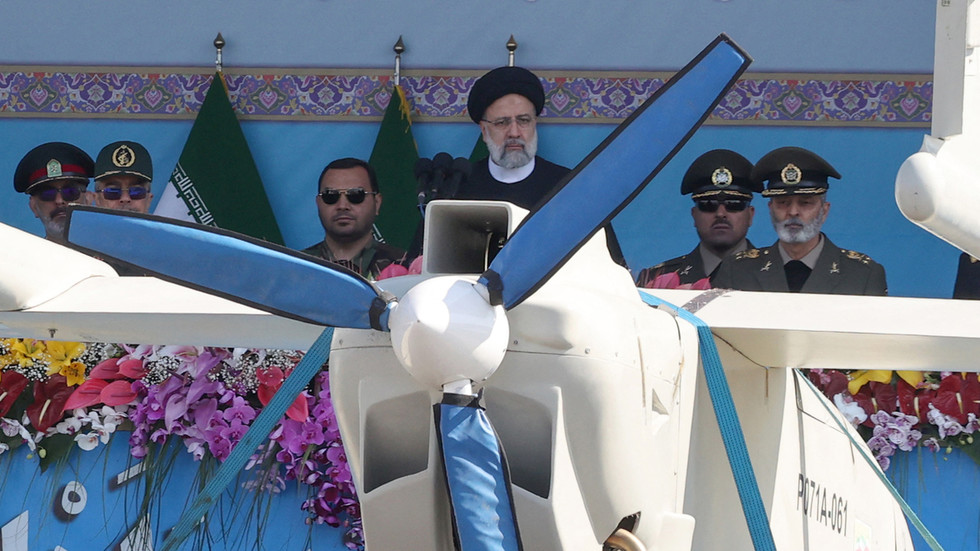
The world’s top superpower has failed to crush Tehran, so what hope does London have?

Robert Inlakesh is a political analyst, journalist and documentary filmmaker currently based in London, UK. He has reported from and lived in the Palestinian territories and currently works with Quds News. Director of ‘Steal of the Century: Trump’s Palestine-Israel Catastrophe’.
Robert Inlakesh is a political analyst, journalist and documentary filmmaker currently based in London, UK. He has reported from and lived in the Palestinian territories and currently works with Quds News. Director of ‘Steal of the Century: Trump’s Palestine-Israel Catastrophe’.
@falasteen47

Iran’s President Ebrahim Raisi at a military parade marking the country’s annual army day in Tehran on April 18, 2023 © ATTA KENARE / AFP
The UK’s new sanctions regime against Tehran will make little material difference, other than prompting unneeded backlash and imprinting the impression of recklessness on the government in London. As Iran rises in today’s multipolar world, Britain’s obsession with the Western order of the past only weighs it down.
British Foreign Secretary James Cleverly announced that his government had decided to create a new sanctions regime for Iran, expanding the United Kingdom’s powers to sanction decision makers in Tehran to include those allegedly involved in weapons proliferation. US State Department spokesperson Matthew Miller quickly responded to “welcome the United Kingdom’s announcement of plans to create a new sanctions authority,” going on to encourage “additional measures by all like-minded partners to address Iran’s hostile actions.” Iran, on the other hand, retaliated by summoning the UK’s chargé d’affaires to Tehran over Britain’s “destructive and interventionist” remarks.
Despite the seeming seriousness with which the British government has announced its new decision, the reality is that its sanctions will make little difference to Iran’s predicament. Since 2018, when then-US President Donald Trump unilaterally withdrew from the Iran Nuclear Deal and pursued the currently persisting ‘maximum pressure’ sanctions campaign, the Iranian government has evolved to try and circumvent the consequences of such measures. London does not have nearly as significant a position in the global economic arena as its ally in Washington. If Tehran hasn’t been forced onto its knees by the world’s dominant economic power, the likelihood of sanctions that could target Iranian actions inside the UK itself are unlikely to do much at all to change this situation.
If the sanctions will not do anything, what could be the reason behind the recent announcement in the UK? This could have to do with a number of separate factors. To begin with, Iran has just been accepted as a full member of the Shanghai Cooperation Organisation (SCO). The Islamic Republic has been seeking pathways to reduce the impact of years of isolation from the global economy, something that SCO membership may well help with. Additionally, Tehran has been eyeing a position in the BRICS economic alliance, which at least in principle all member nations have supported. On top of this, Iran and Russia inked a deal for the construction of a rail link as part of the International North-South Transport Corridor (INSTC). Investment in Iran is rising and the nation’s international cooperation is also growing, allowing it to navigate its way around the dictates of the collective West.

Read more
It is likely that the US and its Western partners are in outrage about the successes of Iran, hence are seeking a way to undermine it, or enrage it, because of this. Back in April, something else happened that may have something to do with the recent sanctions declaration by the UK; 125 UK MP’s called upon the government to proscribe Iran’s Islamic Revolutionary Guard Corps (IRGC) as a terrorist organization, following lobbying efforts and the recommendations of influential think tanks. The European Union also announced its intentions to designate the IRGC as a terrorist group. In both cases, this has not been followed up on, likely because this would lead to any support for the Iranian government being interpreted as support for terrorism and even the expulsion of Iranian ambassadors, a step that likely seems too heavy for the current predicament. Therefore, the failure of the UK to commit itself to this is leading to criticism from inside the parliament itself, over the introduction of a policy that could be designed to avoid going through with the proscription.
The UK, along with its Western allies, continues to follow Washington’s lead on issues pertaining to Iran, the same US government that is controlled by a president, Joe Biden, who had promised to return to the 2015 Nuclear Deal and ended up doubling down on the Trump administration’s hardline sanctions stance instead. The consideration of ushering in a terrorist group designation for the IRGC, for introducing new sanctions and the constant baseless accusations regarding the pursuit of nuclear weapons by Iran, all amount to meaningless tantrums.
The UK has now joined Ukraine, Canada, and Sweden in seeking an International Court of Justice ruling that Iran illegally shot down Ukraine International Airlines Flight PS752 in January 2020. Although this tragedy was clearly not deliberate, the Western media and governments carry on as if Iranian air defense purposely killed all 176 passengers on board, omitting the fact that there were legitimate threats of incoming US air attacks on the country, following the IRGC’s firing of ballistic missiles at the Ain al-Assad military base in Iraq, as a response to the US drone strike assassination of its General Qassem Soleimani. Although there are claims of a lack of transparency from Tehran, the Iranian authorities did sentence ten people to prison for what they deemed to be a misfiring of air defense missiles at the aircraft. Days prior to the incident, US President Donald Trump had publicly threatened to strike over 50 targets inside Iran, including cultural sites.
The UK refuses in all cases to take any responsibility for its own wrongdoing and persists in doing Washington’s bidding, lashing out at Iran at a time when a cost-of-living crisis plagues its own people. The British government chooses to spend its time lecturing the world, while refusing to adopt an approach that will provide a stable living condition and future for their own citizens. The government in Tehran isn’t going anywhere, the UK’s fanciful machinations regarding regime change there are not helping, and attempts to delegitimize Iran will only create an unneeded backlash, while demonstrating to nations outside of the West that the same Western arrogance blinds it from engaging in the emerging multipolar order.
The statements, views and opinions expressed in this column are solely those of the author and do not necessarily represent those of RT.




